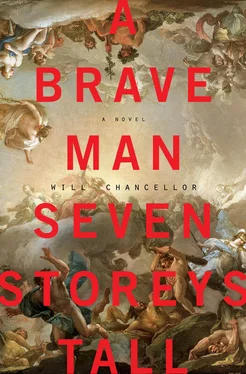In her life, Bill had been bronze and absent. With Caroline’s death, Bill’s gaze dropped a few degrees every day. During their bourbon-soaked afternoons, he kept his chin to his chest as if he were trying to prevent someone from choking him. When Burr looked closely, he could see a fist knuckling at the man’s wattles, a phantom hand prying up that once-proud chin.
President Bill Dennison quickly grew old, pale, and clatty. He said his office was the only place he still felt free because it was a place he knew was about to be taken away. His hands, always curled in near fists, shook with fear and with pride, like a child holding a cicada. He looked Burr squarely in the eye for the first time in their relationship. And when he did, Bill found a man on his level.
Owen eventually did take two lives: his mother’s and his only surviving grandparent’s. In hindsight, Bill had given a few months’ notice, but he never said anything specifically about his plan.
Mountains take. Cliffs take. Dennison’s car was found off Highway 1 by a team of rescue divers a month to the day after his last drink with Burr. He left behind a letter on his desk stressing to the trustees that Burr, nepotism aside, was his natural successor.
Once Burr caught wind of his father-in-law’s last request, he asked to be removed from consideration. Burr suggested his best friend and fellow young luminary Gerard Gaskin for the post. The board, who’d had Gaskin, MBA holder and faculty senator, in mind all along, congratulated themselves on an amicable transference of power. The trustees extended a ninety-nine-year lease to Burr on his father-in-law’s residence, thinking that it would be fitting that Owen grow up in the home his grandfather had a hand in constructing.
With Bill’s death came the realization that Owen would have no one else’s account of Caroline. The portrait that would hang in Owen’s mind would have to be painted by Burr’s shaking, foolish hand. He would have to sing the lullabies, her songs, even though he couldn’t force out a note.
Burr spent his first month in their new house scavenging for photos, dangling Bill’s books by the spine in case a portrait of Caroline was marking a page, then dropping them to the floor. Caroline was only smiling in two pictures — crushing, because she had dozens of smiles that would now fade and disappear, impossible for him to recover and for his son to learn.
Burr’s academic career had run aground. He was called before a committee tasked with managing the transition of administrations, certain he would be negotiating severance and extended benefits for Owen.
Rather than talk about his drinking or read disgruntled letters from his seminar students, they framed the meeting as early tenure review. Later he would realize that no one had any intention of promoting him to associate; tenure review was merely a polite pretext for them to illustrate his downfall. In the words of the provost, “Institutions cannot invest in speculation.” They said his thinking was undisciplined, code for not publishing in peer-reviewed journals. They said the liminality work lacked focus. He blurted out, “That’s the point!” Which was when they suggested he stop drinking with the adjuncts in the Poetry Department.
He was given three years to shape up. Burr surprised himself at how industrious he became following their censure. During his three-year probation he trotted out significant textual analysis in the biggest journals — the Journal of Hellenic Studies, Classical Quarterly, Hermes, Classical Philology , and the American Journal of Philology— thereby moving from the fringes of classics to the center. Joseph Burr was now the authority on Homer’s use of the aorist middle, which is to say, as mainstream as classics professors come.
The black carry-on he wheeled into his next committee hearing buckled under the weight of peer-review journals. He stacked them high in three ecru columns and then sat with his hands folded before him, conscious of looking a bit too much like the chip leader in a poker game. The university didn’t mind the swagger; it was publish or perish, and he had published. On the day he was promoted to associate professor, he had a following of eager grad students compiling several words per day for the ill-fated Hapax . Gone were the days of even the slightest excursus. He was scrubbed of liminality and academically sober.
But the drinking still came in waves. Burr waited at a neighborhood stoplight, looking at the passenger seat, tracked back to fit Owen’s knees and reclined to make room for his head. He wondered how many months would pass until someone else would adjust it back. After today, no one could blame him for needing a drink. Once the Volvo was docked in his garage, dripping oil on the concrete slab and panting, Burr shuffled to his local.
He wrote on napkins while boisterous kissers and fancy handshakers bubbled around and jostled his bent elbow:
Our ground is birth. Our death is sea. Two things our mind will never know, birth and death, things that are uniquely ours yet things we never have, things we are not there to inhabit, define the mind before we are given the chance. This curling throw, ripped back at once. We are the liminal. We are the wash. But he. His birth set stakes, two stakes, birth and different death implied. Always tightroping those two spikes in the ground. He jumped. And when he landed, it’s no wonder he ran .
THREE.IT’S BERLIN, WE’RE ALL MONSTERS HERE
Through a wet March, Owen breezed across Berlin on his hostel’s beach cruiser, pedaling the one-speed bike with firm unhurried strokes, leaning into turns and sidewinding from Ostkreuz to Charlottenburg. Over the rain-slicked roads of the Tiergarten park, asphalt dolphin-smooth, he skimmed quarter miles of cosines with broad sweeps from curb to curb.
Each morning at the Tiergarten he joined images, paired words, and left with something glazed and sharp, more pottery shard than poem. With a handful of shards he pieced a bright mosaic of memories against the grey Berlin sky: lurid storefronts splashed with ancient yellow; Helvetica shouts in stoplight red; stockinged women stenciled to walls in dripping royal blue; canary-yellow bugle calls of the Postbank; kiosk green and construction orange on every corner; a full spectrum of brick from red to brown; Army-Navy stores spilling seaweed wares to the curb; consignment shop employees with purple-red bob cuts sitting on molded plastic chairs; the plumes of squinting smokers; the expired green of shutters climbing to roofs and tiling the sky.
He was the metal comb, and Berlin was the music box — his fingers extended to plink each note of color and spin the day’s melody. Everything was becoming clear except his vision of himself as an artist. He wanted to play with memory and maps, but had no specific plan about integrating them into an artwork. In art libraries and bookstores he studied Richard Long and Hamish Fulton. He fasted for a week to afford a student membership at the Hamburger Bahnhof museum and spent entire afternoons in front of the Anselm Kiefers.
One March day, in front of Kiefer’s enormous lead airplane The Angel of History (Poppy and Memory) , a man with shoulder-length hair and a scholarly bent caught him jotting down an observation on Mnemosyne, goddess of memory, underneath a rough pencil sketch. Shy, suspicious, Owen folded from attention. But the man persisted.
— People get too hung up on Kiefer’s scale and miss the mud, the materiality, the lead to silver to gold.
— The thin blue of the lead and ash under these skylights, the filter is… familiar.
— Are you a student or an artist?
— I’m an artist.
Читать дальше












